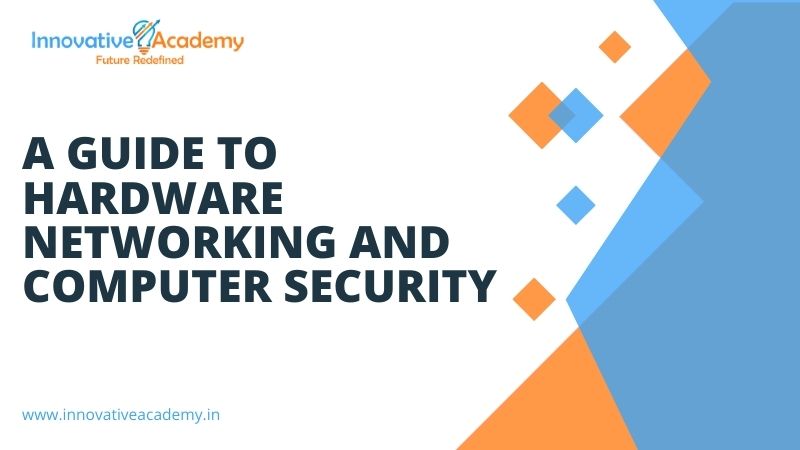A Guide to Hardware Networking and Computer Security
Table Of Content
- What is hardware networking?
- Types of hardware networking devices
- Importance of Computer security
- Threats and hacks of computer security
- FAQ’s
In an era where our life is completely dependent on technology, we have to understand how it works. All of us are using and sometimes even abusing the internet but do we understand the importance of being aware of the dangers it comes with? I doubt it. Our lives have become very easy because of the internet but there are so many disadvantages associated with this that if we do not exercise proper care, our lives may be in danger or simply become a matter of embarrassment.
In this article, “A Guide to Hardware Networking and Computer security” we have explained at length the way the internet works and the importance of understanding how to handle it appropriately.
What is hardware Networking?
The discrete elements that make up a network system and are in charge of data transmission and network operations support are known as network hardware. Even though a network involves a large number of physical components, the system’s overall functions may be broken down into a few fundamental categories. In this article, “A Guide to Hardware Networking and Computer Security” we have mentioned various categories and how each one affects the network system’s overall functioning.
A group of physical or network devices that are necessary for interaction and communication between hardware units working on a computer network are referred to as network hardware.
Most commonly used network device types
Router
By navigating a path through the sea of interconnected networking devices utilising various network topologies, routers assist in the transmission of packets to their final destinations. Routers are clever machines that keep records of the networks to which they are connected. The majority of routers may be set up to function as firewalls with packet filtering and access control lists (ACLs). In order to convert from LAN framing to WAN framing, routers work with a channel service unit/data service unit (CSU/DSU). Because LANs and WANs employ different network protocols, this is necessary. Border routers are such routers. They function at the edge of your network and act as the LAN’s external connection to the WAN.
Point of Access
In contrast to a router, an access point (AP) is a network device that has an antenna, transmitter, and adapter already built in. Different network devices, including wired and wireless ones, can be linked together using an AP. There are both fat and skinny access sites. While a thin AP can be set up and monitored remotely, a fat AP requires manual configuration of its network and security settings.
Switch
Hubs typically play a less intelligent role than switches. A multiport device called a switch increases network effectiveness. The switch permits connections to hubs or routers while maintaining a minimal amount of routing information about internal network nodes. Switches are typically used to link LAN strands. Switches typically have the ability to read the hardware addresses of incoming packets and send them to the correct location.
Modem
Signals between devices, such as those going from analog to digital, are modulated and demodulated by a modem, which serves this function primarily. The most popular modem today is an internet modem, which makes it easier to access the internet by receiving signals from an ISP and translating them into a format that is compatible with connected devices, such as radio or digital signals.
Bridge
A bridge is used to link hosts or different network segments. They function similarly to routers in that they can be used to split up bigger networks into smaller ones by managing traffic flow while residing in between network devices. Additionally, a bridge has the capacity to filter frames; data packets, before they are forwarded. Switches, which offer better functionality, are now taking the place of bridges, which are less common than they once were.
Hub
Hubs link various computer networking components together. In that it amplifies signals that degrade after travelling over long distances on connected wires, a hub also performs the function of a repeater. Due to the fact that it links LAN components with a hub, the family of network connecting devices is the most basic one.
Repeater
A repeater amplifies a signal and sends it again to the intended location. Repeaters are used to increase a signal’s range, get around interference, and counteract attenuation. In addition to working with fibre optics, telephones, and TV transmission, they are frequently employed in wireless networks.
Gateway
To enable interoperability between several technologies, such as Open System Interconnection (OSI) and Transmission Control Protocol/Internet Protocol (TCP/IP), a gateway device is utilised. They effectively translate one another’s messages. A gateway can be compared to a router with enhanced translation capabilities.
Computer Security
Let’s first grasp what cyber security is and why it is important before we start with this tutorial on cyber security. Technology and procedures used in cybersecurity are intended to shield networks and devices from intrusions, harm, and unwanted access. Since data is now the foundation of every organisation, cybersecurity is crucial for a nation’s military, hospitals, large corporations, small businesses, and other organisations and individuals. There are many hazards involved with using the data for profit.
Internet users now have a fundamental right to obtain computer and internet security. You should actually not only protect your online privacy, but also educate those around you about it. Additionally, it would be beneficial if you made plans for your family’s online safety while using your home network. This thorough security writeup, ”A Guide to Hardware Networking and Computer Security” explains how to provide your entire family with reliable internet and computer security.
Importance of computer security
Computer security or cybersecurity is important because it protects all forms of data from loss and theft. Intellectual property, sensitive data, protected health information, individually identifiable information, and government and commercial information systems are all included.
The practice of protecting networks, computers, and data from online threats is known as cybersecurity or computer security. These assaults frequently entail attempts to access, alter, or harm the target’s computer system, disrupting or stopping services, stealing proprietary or confidential data, and disclosing personal information.
You may have heard a 1000 times about a particular system being hacked, not on a small level, but this threat is suffered by major IT companies too.
The cybersecurity industry is constantly expanding and evolving. In the past, the main goal of cybersecurity was to stop access from the outside by creating a perimeter of defence tools, such firewalls or antivirus software, to stop online crimes. These offences extend back to the 1970s, when time for long-distance calls was stolen by targeting early computerised phone networks.
In this article of “A Guide to Hardware Networking and Computer Security” we have tried to sum up offences and steps to stay safe from attacks.
Below is a list of common computer security risks:
Phishing
Phishing must be the most common kind of threat all of us have faced. Phishers seek to obtain critical financial or personal information through fake email or instant chats by posing as a reliable person or company. One of the most effective strategies used by cybercriminals to commit a data breach is phishing assaults. Antivirus programs that offer identity theft protection can be “taught” to identify phishing threats in a matter of milliseconds.
How to counter the phishing problem?
No allegation has been made that there is an issue with your account or your payment information; rather, they have seen some suspicious activity or log-in attempts. You don’t need to verify any personal or financial information, as there is no requirement to do so. Include a phoney invoice you’re not familiar with, ask you to click on a payment link that contains malware, or claim you qualify for a government refund while actually asking you to signup for a scam, or provide a false coupon for free goods.
Viruses
A program known as a computer virus is one that is installed on your computer system without your knowledge or consent and has the potential to malfunction. A computer virus has the ability to spread and replicate, allowing it to infect all the files and documents in the computer system. Your sensitive information may also be tainted by it. The user’s computer system could suffer serious damage from these viruses, which could also render it useless.
How to counter the virus problem?
Avoiding viruses requires carefully assessing free software, downloads from peer-to-peer file sharing websites, and communications from shady senders. The majority of modern web browsers offer security settings that can be increased for the best protection against online threats. But as we’ll reiterate throughout this post, the most reliable method of warding off viruses is to use latest antivirus software.
Ransomware
Although ransomware can take many different forms, all of it operates on the same fundamental premise: You must pay a ransom in order to access your data. Attackers frequently launch a second ransom demand to prevent the online sale of stolen data.
How to counter the Ransomware problem?
Regardless of the situation, you should always back up your data and keep a robust incident response plan in place. Maintaining reliable backups in a secure location is crucial for ransomware mitigation because it can be the difference between having to pay a huge ransom and being able to immediately detect a breach and restore your data after a brief outage.
The above mentioned are only a few threats faced in cyberattacks. There are so many of them that it is imperative that you stay updated on the issues and keep yourself safe from predators.
We hope this article “A Guide to Hardware Networking and Computer Security” helps you understand the way the internet works and stay safe!
FAQ’s
- Is network security important for a company?
Any organisation needs to prioritise network security. It is essential for safeguarding data and other sensitive information kept in databases. It extends data security by preventing access by unauthorised individuals and filtering out potential dangers that can have negative consequences.
- How do I stay safe from cyber attacks?
In general, it’s best for users to establish solid and strong passwords for accounts, use private networks like VPNs, and never leave costly electronics out of sight. Aside from efficient network security procedures, it’s critical to keep in mind that there are disadvantages, such as setup costs and negligent administrations that might ignore the network’s architecture. Ultimately, there are more advantages than disadvantages to consider in terms of network security.





No Comment